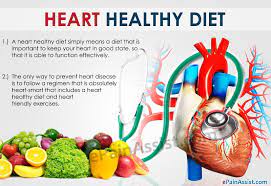You know that exercise and a good diet can keep your heart healthy. But what else can you do to keep your ticker going strong? Here, cardiothoracic surgeon Marc Gillinov, MD, recommends five key things you need to do every day to help your heart work most efficiently. Incorporate these habits into your lifestyle and your heart health will be the best it can be for you.
Eat healthy fats, NOT trans fats. We need fats in our diet, including saturated and polyunsaturated and unsaturated fats. One fat we don’t need is trans fat, which is known to increase your risk of developing heart disease or having a stroke over a lifetime. This is because trans fat clogs your arteries by raising your bad cholesterol levels (LDL) and lowering your good cholesterol levels (HDL). By cutting them from your diet, you improve the blood flow throughout your body. So, what are trans
- fats? They are industry-produced fats often used in packaged baked goods, snack foods, margarines and fried fast foods to add flavor and texture. TIP: Read the labels on all foods. Trans fat appears on the ingredients list as partially hydrogenated oils. Look for 0 percent trans fat. Make it a point to avoid eating foods with trans fat.
- Practice good dental hygiene, especially flossing your teeth daily. Dental health is a good indication of overall health, including your heart, because those who have periodontal (gum) disease often have the same risk factors for heart disease. Studies continue on this issue, but many have shown that bacteria in the mouth involved in the development of gum disease can move into the bloodstream and cause an elevation in C-reactive protein, a marker for inflammation in the blood vessels. These changes may in turn, increase your risk of heart disease and stroke. TIP: Floss and brush your teeth daily to ward off gum disease. It’s more than cavities you may have to deal with if you are fighting gum disease.
- Get enough sleep. Sleep is an essential part of keeping your heart healthy. If you don’t sleep enough, you may be at a higher risk for cardiovascular disease no matter your age or other health habits. One study looking at 3,000 adults over the age of 45 found that those who slept fewer than six hours per night were about twice as likely to have a stroke or heart attack as people who slept six to eight hours per night. Researchers believe sleeping too little causes disruptions in underlying health conditions and biological processes, including blood pressure and inflammation. TIP: Make sleep a priority. Get 7 to 8 hours of sleep most nights. If you have sleep apnea, you should be treated as this condition is linked to heart disease and arrhythmias.
You know that exercise and a good diet can keep your heart healthy. But what else can you do to keep your ticker going strong? Here, cardiothoracic surgeon Marc Gillinov, MD, recommends five key things you need to do every day to help your heart work most efficiently. Incorporate these habits into your lifestyle and your heart health will be the best it can be for you.
Eat healthy fats, NOT trans fats. We need fats in our diet, including saturated and polyunsaturated and unsaturated fats. One fat we don’t need is trans fat, which is known to increase your risk of developing heart disease or having a stroke over a lifetime. This is because trans fat clogs your arteries by raising your bad cholesterol levels (LDL) and lowering your good cholesterol levels (HDL). By cutting them from your diet, you improve the blood flow throughout your body. So, what are trans
- fats? They are industry-produced fats often used in packaged baked goods, snack foods, margarines and fried fast foods to add flavor and texture. TIP: Read the labels on all foods. Trans fat appears on the ingredients list as partially hydrogenated oils. Look for 0 percent trans fat. Make it a point to avoid eating foods with trans fat.
- Practice good dental hygiene, especially flossing your teeth daily. Dental health is a good indication of overall health, including your heart, because those who have periodontal (gum) disease often have the same risk factors for heart disease. Studies continue on this issue, but many have shown that bacteria in the mouth involved in the development of gum disease can move into the bloodstream and cause an elevation in C-reactive protein, a marker for inflammation in the blood vessels. These changes may in turn, increase your risk of heart disease and stroke. TIP: Floss and brush your teeth daily to ward off gum disease. It’s more than cavities you may have to deal with if you are fighting gum disease.
- Get enough sleep. Sleep is an essential part of keeping your heart healthy. If you don’t sleep enough, you may be at a higher risk for cardiovascular disease no matter your age or other health habits. One study looking at 3,000 adults over the age of 45 found that those who slept fewer than six hours per night were about twice as likely to have a stroke or heart attack as people who slept six to eight hours per night. Researchers believe sleeping too little causes disruptions in underlying health conditions and biological processes, including blood pressure and inflammation. TIP: Make sleep a priority. Get 7 to 8 hours of sleep most nights. If you have sleep apnea, you should be treated as this condition is linked to heart disease and arrhythmias.


Post a Comment
Post a Comment